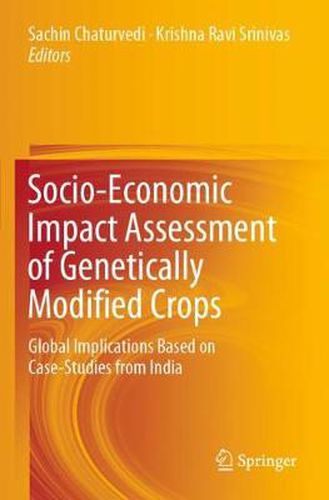Readings Newsletter
Become a Readings Member to make your shopping experience even easier.
Sign in or sign up for free!
You’re not far away from qualifying for FREE standard shipping within Australia
You’ve qualified for FREE standard shipping within Australia
The cart is loading…






This book provides a comprehensive overview of socio-economic impact assessments for genetically modified organisms, including genetically modified crops. It features case studies involving Bt cotton and other selected crops with improved traits from six major institutions in India and combines field data with surveys on stakeholder perceptions. It also discusses global trends in the socio-economic assessment of GMOs and reviews the available literature on the economic assessment of GM crops and how various countries have implemented Article 26.1 of the Cartagena Protocol on Biosafety. Further, it explores cost-benefit analyses and sociological aspects of socio-economic assessments.Based on this, the book proposes a framework and offers guidelines for socio-economic assessment that can be adapted for various GM crops. Lastly, it examines the relevance of socio-economic impact assessment in light of new applications such as GM mosquitoes and gene drives. Given its scope, the book is of interest to all academics, policymakers, regulators, and general readers concerned about the broader impacts of GM crops and applications like gene drives.
$9.00 standard shipping within Australia
FREE standard shipping within Australia for orders over $100.00
Express & International shipping calculated at checkout
This book provides a comprehensive overview of socio-economic impact assessments for genetically modified organisms, including genetically modified crops. It features case studies involving Bt cotton and other selected crops with improved traits from six major institutions in India and combines field data with surveys on stakeholder perceptions. It also discusses global trends in the socio-economic assessment of GMOs and reviews the available literature on the economic assessment of GM crops and how various countries have implemented Article 26.1 of the Cartagena Protocol on Biosafety. Further, it explores cost-benefit analyses and sociological aspects of socio-economic assessments.Based on this, the book proposes a framework and offers guidelines for socio-economic assessment that can be adapted for various GM crops. Lastly, it examines the relevance of socio-economic impact assessment in light of new applications such as GM mosquitoes and gene drives. Given its scope, the book is of interest to all academics, policymakers, regulators, and general readers concerned about the broader impacts of GM crops and applications like gene drives.